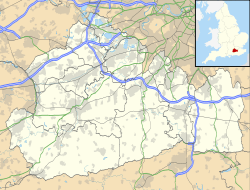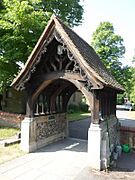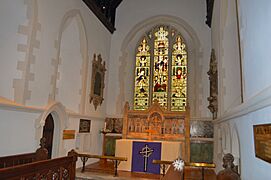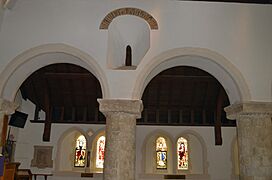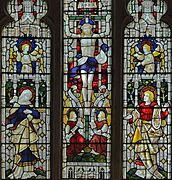Church of St Mary, Fetcham facts for kids
Quick facts for kids St Mary's Church, Fetcham |
|
|---|---|
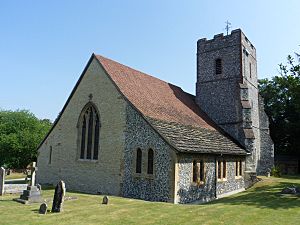
St Mary's Church, Fetcham
|
|
| 51°17′17″N 0°21′11″W / 51.288°N 0.353°W | |
| Denomination | Church of England |
| Churchmanship | Evangelical |
| Website | http://stmarysfetcham.org.uk/ |
| History | |
| Dedication | St Mary |
| Administration | |
| Parish | Fetcham |
| Deanery | Leatherhead |
| Archdeaconry | Dorking |
| Diocese | Guildford |
| Province | Canterbury |
St Mary's Church in Fetcham, Surrey, England, is a very old church. It belongs to the Church of England. The building itself was built around the 11th century, which was when the Norman Conquest happened. This makes it the oldest building in Fetcham!
The church is located off The Ridgeway, behind a small park. Fetcham is a town that grew a lot in the 1900s, especially because of the railway. It's close to the M25 London Orbital Motorway, but still has some green, farming areas around it. Nearby, you'll find Fetcham Park House, which is also a very important old building. The church also has a hall next to it.
Contents
Church Building and Features
The church building was put together during the Anglo-Saxon and early Norman times. Experts think it might have been built on top of an even older Anglo-Saxon church. They found old Roman bricks in the church walls. These bricks, along with other old parts, show how ancient the building is.
Old Parts of the Church
You can still see signs of the church's long history. For example, some cornerstones, called quoins, on the outside of the church are very old. There's also a special window high up on the south wall. It has traces of Roman bricks. The shapes of the arches inside the church also match buildings from before the Norman Conquest in 1066.
Victorian Changes
In the 1800s, a lot of work was done to improve the church. This was called a Victorian restoration. A rector named Rev. Sir Edward Moon led these changes from 1854 to 1904. He added beautiful stained glass windows during this time. Much of the work also remembered his father, Sir Francis Moon.
Hidden Wall Painting
In 1857, a painting from the 1200s was found on a wall. It was at the east end of the North aisle. The original painting is not there anymore. However, you can see a full-size copy of it. There is also a photo of it in the church's records.
Special Status
Because of its history and architecture, St Mary's Church was given a special status in 1951. It is now a Grade II* listed building. This means it's a very important historical building.
Church Services
St Mary's Church offers many services for its community. These services happen throughout the week.
Sunday Services
- At 8:00 AM, there is a Communion Service. This uses the Book of Common Prayer.
- At 9:30 AM, another Communion Service takes place. This one uses Common Worship.
- At 11:15 AM, there is an Informal Worship service.
- On the first Sunday of each month, the 11:15 AM service is called Gener8 All Age worship. This service is for everyone.
Sunday Evening Services
- On the second Sunday, there is a Choral Evensong. This service includes singing by a choir.
- On the third Sunday, you can find RESTORE Cafe Church.
- On the fourth Sunday, there is a REFLECT reflective service.
Midweek and Saturday Services
- Every Thursday at 10:00 AM, there is a midweek communion service.
- On Saturday mornings at 9:30 AM, the church holds a parish prayer meeting.
Activities for Children
- Activ8 is for children under 12.
- A Creche is available for children under 3.
- These groups meet on Sundays at 9:30 AM and 11:15 AM. They do not meet when Gener8 All Age worship is happening at 11:15 AM.
Monuments and History
Inside the church, you can find old monuments on the walls. These remember people from the past.
Wall Monuments
There are monuments for Anthony Rous and Henry Vincent. Both of them passed away in 1631. Henry Vincent's monument shows a praying statue with an open book. It is decorated with small columns.
Charitable Trust Tablet
In the porch, there is a large stone tablet from 1717. This tablet tells about a special fund called a charitable trust. For many centuries, this trust helped poor people in the area. The local church leaders managed this help. This continued until modern local government took over these duties.
Gallery
See also
 | Misty Copeland |
 | Raven Wilkinson |
 | Debra Austin |
 | Aesha Ash |


